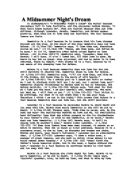The first problem is set up only 20 lines into the first page with the entrance of Egeus and his “vexation” at the disobedience of his daughter Hermia. The scene begins with Theseus and Hippolyta discussing their impending marriage, this is when Egeus enters with Hermia, Lysander and Demetrius. Egeus then explains that Demetrius has his blessing to marry Hermia but she refuses to abide as she loves Lysander. Egeus then goes on to express his disdain for Lysander as he has ‘bewitched the bosom of his child’ and ‘filched his daughter’s heart’ with “love-tokens”, “rings, gauds, conceits, Knacks, trifles, nosegays, sweetmeats & messengers”.
This scenario would most likely cause an Elizabethan audience to scoff at Hermia because at the time it was expected of a daughter to be inherently submissive to her father’s will. This provides ample anachronistic value to the play which acts as a tool for both comedy and drama. Coincidently a 21st century audience would also scoff at the situation, but at Egeus instead of Hermia – this can be attributed to the considerably more liberal societarian values we have today.
Upon this Lysander retorts, saying: since Egeus loves Demetrius so much the two should get married “You have her father’s love, Demetrius – Let me have Hermia’s. Do you marry him?” - The first bawdy insult of many in the play; implying a homosexual relationship between Egeus and Demetrius. In addition to this Lysander points out that Egeus’ disdain is irrational as Lysander is equally if not more fit to be a son in law: “I am, my lord, as well derived as he, as well possessed. My love is more than his; my fortunes every way as fairly ranked – if not with vantage as Demetrius’” concluding with another amusing stab at Demetrius’ integrity: “Demetrius - I’ll avouch it to his head – made love to Helena, and won her soul; and she, sweet lady, dotes... Upon this spotted and inconstant man”
Here we see Shakespeare creates humour at the expense of Egeus and Demetrius through Lysander and his wit, subsequently neither Demetrius nor Egeus responds; instead Theseus empathises with Lysander as he too has heard rumours about Demetrius and Helena. Then Theseus asks both Demetrius and Egeus to exit with him as ‘he has some private schooling for them both’. At this point Lysander and Hermia are the only characters on stage and they begin to plot their eloping out of Athens thereafter Helena enters rather upset (and it seems she remains so throughout the entirety of act one) complaining about her unrequited love for Demetrius, so in an effort to lift Helena’s melancholy Hermia tells Helena about her plans to elope with Lysander. The scene is concluded with a monologue from Helena describing to the audience that she will tell Demetrius about the two young lover’s plot in a bid to earn his approval.
With the end of scene one the primary complication is completed and presented to the audience in its entirety. I believe Shakespeare does this in a rather hurried manner but only to aid the progression of the play from the old world because he understands that humour must be minimal until the green world is reached, otherwise the plot structure must become more complex and the play becomes less identifiable as a comedy which would result in it losing its light-hearted feel and could even end up boring the audience.
In the second scene we are introduced to the mechanicals who are planning to put on a play, ‘Pyramus and Thisbe’ – a well recognised Roman tragedy, in anticipation of Theseus’ and Hippolyta’s wedding. In Shakespeare’s day the actors portraying these characters would have been dressed as clowns and it is easy to identify how this reflects in their ineptitude and the humorous traits in their character. The sub-plot that the mechanicals follow runs parallel with the main complication and their appearance in act one, I believe, serves only to advance the play into the green world, allowing the veracious comedy and entertainment to fully bloom as this is where the chaos, conflict resolution and supernatural are able to occur








